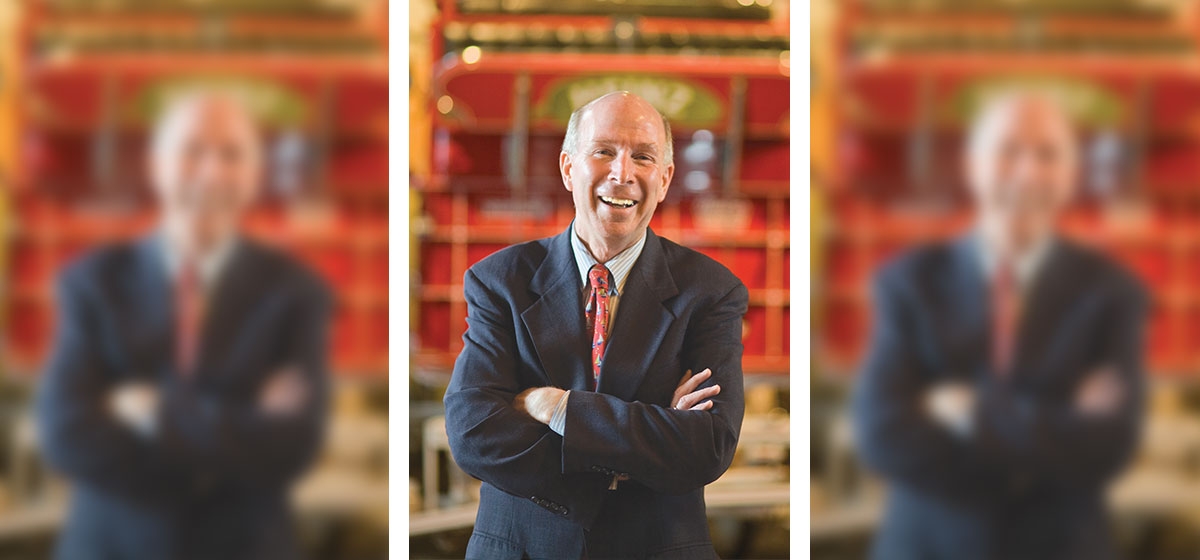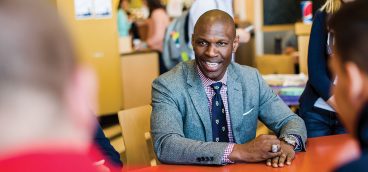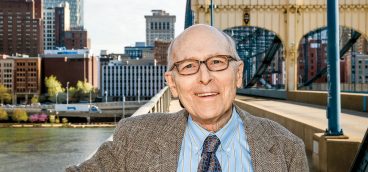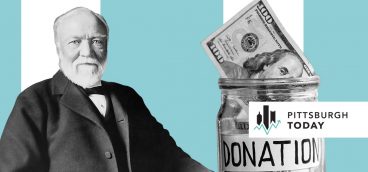Robert F. Vagt, The Heinz Endowments

I can’t look at my career path and, with a straight face, tell anyone that it was the result of a plan. I was born in Delaware. My folks split up, and then my mother and I moved to Connecticut in the years before I went to college.
My grandfather was a Presbyterian minister. My mom was an organist for the church choir. So since the beginning, the church was an important part of my life.
After high school, I went to Davidson College, in small-town North Carolina. Why does anyone go to college? Answer: to pick something in which you have an interest and to study it. So I got a degree in psychology and then went to divinity school at Duke. I became an ordained minister in 1972.
I always worked when I was in college, and, as it turned out, I had to do the same in divinity school. So I got a job as a psychologist in the North Carolina prison system. From that point on, I met a person here or created a contact there, and that led to the next job.
I believe that you must fill your life with two sets of activities: things you do to put bread on the table; and things you do to accomplish something meaningful for yourself and others. Sometimes you can accomplish both within the same job. Sometimes you can’t. When Ifinally left corrections and the mental health profession, I took a public finance job with the New York State Division of Budget. Then I went into the oil and gas business. Both were good and honorable jobs, but they were nothing like working in prisons or mental health. Through those years, I had employment to pay the bills and my community work and the church to fulfill me spiritually. I went on to become president of Davidson College and then came to The Heinz Endowments.
Prior to my last couple of jobs, if you’d asked me what job was the most enjoyable — not the fun sense of enjoyment, but enjoyable in terms of being enriching, challenging and meaningful — I would have said working in the prison system. It was extraordinary. You find yourself interacting with people of whom society has washed its hands. Somehow, we have not been able to rise above our own emotions to learn how to deal with such people.
In prison, there is a code of ethics. When I was about 25, I was the warden of a facility that had two cell blocks. It wasn’t a huge prison, maybe 200 inmates. One night on third shift, I went as I usually did to check on things and found that one of my officers was in a fight, trying to prevent an assault. A big, strong guy was attacking a young, small guy for reasons that are probably self-evident. I said to the officer, “Lock me in there and go call the highway patrol!” So I went in — and the assault continued. I said to the attacker, “You must give me that knife! You have to stop this!” Eventually, the assailant backed away. I got the knife and calmed him down. Later, I found out that a buddy of the guy whose knife I took was coming up behind me with a bed-leg to let me have it. But because he was coming up from behind, some inmates stopped him. That violated their code. I tell you this because people think that prison life is mayhem and that there are no rules. But there are, and prisoners abide by them. True, the whole episode was stupid on my part. I got caught up in the moment. And I was scared afterward. I guess I was filled with that youthful sense of invincibility. At that young age, you don’t stop and ask, “Gee, how smart is this really?”
Most of all, what I learned working in prison is that the population inside is just like the population of any other group. It’s not monolithic or monochromatic. The inmates are not all evil. You do find some people for whom the notion of right and wrong is not a particularly well-formed concept. But then you find, at the other end, people for whom right and wrong are perfectly clear, and, but for a single event that happened in their lives, they’re just like you and me. The prison experience teaches you that, as O. Henry once said, “The whole world is kin.”
I have two daughters, both of whom went to Davidson. They’re both teachers, too. I also have two grandsons, and a wife who has always worked much harder than I. Many of the good things that happened for me were connected to her. Wherever I’ve gone in our communities, she went, too. I got used to being known to some people as “Ruth Anne’s husband.”
My 10 years as president at Davidson were wonderful, and I still can’t figure out what I ever did to deserve that lucky break. I was happy, living in Houston and running an oil and gas company. Then one day, I got a letter from my alma mater, from a trustee search committee. Davidson’s president had announced that he was leaving and they were leaflet-bombing the Western Hemisphere looking for a successor. The letter said, “Bobby, your name has been submitted.” I laughed because I had earned no terminal degree. The only person who laughed more loudly was my wife. But as always, circumstances just seemed to work out.
I loved that job. I like a lot of things going on. We had 615 employees, 600 acres and 130 buildings. But more importantly, we had 160 faculty members and 1,700 students who kept things alive. It was like a city. What was the most important thing I did while I was there? Most people would expect me to talk about how much money was raised or how many buildings got built. Now, those things are important, but if you really want to know what made it all worthwhile, this is the answer: young people. I had academic advisees the whole time I was there — eight per semester.Two particular advisees, one young man and one young woman, were struggling with some serious personal issues. And within a year or so, they had worked things out for themselves. That was triumph. That was extraordinary. I was very lucky to have witnessed that.
After Davidson, I came here to The Heinz Endowments. This city really intrigues me. If I had to build a new city today, I’d build it pretty much in the image of Pittsburgh. I’d place it amid appealing terrain, which might include some hills and rivers. I’d populate it with folks who, by dint of either history or personality, have a strong work ethic. I’d build a thriving cultural community, large and small outfits, from opera to theater to a bar with good guitar. I’d establish solid institutions of higher learning. And I’d throw in some world-class healthcare and forward-looking high tech. At the end of the day, when you put that entire jumble together, you’d have a mirror image of Pittsburgh.
To be in this great city with this fine institution at this particular time is a true opportunity. I’ve found that The Heinz Endowments is focused, both programmatically and geographically. It has as its backbone a strong family and board. It has an extraordinary staff of committed people. This institution has taken on the responsibility of making life’s circumstances better for people in this region in a very thoughtful way, and I find this very exciting. The public education piece of the local puzzle really grabbed me by the throat and shook me. It’s a huge problem. But if we can solve the public education puzzle here, we will be better able to take care of economic development, the environment and lots of other things over the long haul.
Most institutions say that there are many issues that we ought to be dealing with when it comes to public education. Unfortunately, too often those same institutions choose to address only a single issue or two. Why not take them all on? There may actually be a chance to do something here that hasn’t been done before — a thoughtful approach to an all-important challenge of a very real and significant problem. We have a chance to make genuine progress for real people. I recognize the responsibility that comes with the chair that I’m lucky enough to occupy. There’s a history of strength here, not just in Pittsburgh, but also in the name “Heinz.” When people talk about public trust, I don’t take it lightly. Mine isn’t just a great job. It’s a gift and a great responsibility.




